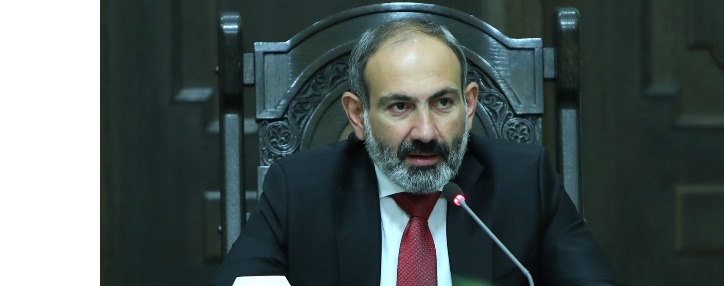War with Azerbaijan is highly likely – Armenian premier
26.07.2018,
11:46
Armenian Prime Minister Nikol Pashinyan said in an interview with Echo of Moscow that a war with Azerbaijan is highly likely.

YEREVAN, July 26. /ARKA/. Armenian Prime Minister Nikol Pashinyan said in an interview with Echo of Moscow that a war with Azerbaijan is highly likely.
“Things are very tense now in our region,” he said commenting on the statement he made recently at a news conference. “I mean Azerbaijan’s aggressive policy. There is a very high probability of war. And I said that we should be ready for a war, But I also said that I, all Armenians and everybody in Armenia are sure that Russia has every means to prevent a new round of escalation in our region and to deter Azerbaijan from assaulting Armenia and Karabakh.”
Pashinyan repeated what he said then: “I can’t believe that Russians will not use these means to prevent a war.”
The Armenian premier said that Russia has every lever and every opportunity to prevent war.
However, he refrained from revealing details of his talks with Russian President Vladimir Putin over sales
of armament to Azerbaijan.
“Arms embargo is a different talk and we will continue this talk not only with Russia, but also with Belarus and our other partners in the Collective Security Treaty Organization, since we are members of the same security organization,” he said. “But, speaking at my press conference, I meant political, geopolitical, economic and direct influence of Russia, possible influence of Russia on our region.”
Pashinyan also confirmed the fact that his son in the military service on the Karabakh frontline.
“He went there as a volunteer,” he said in his interview. “This is very important, and many interpret this as an aggressive gesture. This is a peaceable gesture, since, I think, all of us understand that when I send my son to Karabakh I don’t want war resumption there. God keep my son, sons of my compatriots and sons of Azerbaijan, sons of ordinary Azerbaijani citizens from getting killed!”
He said he would be glad if Ilham Aliyev could send his son there for military service.
“I would take that as a peaceful gesture, and if so, all of us will be sure that Mr. Aliyev wouldn’t want to have his son killed.”
Karabakh conflict broke out in 1988 when Karabakh, mainly populated by Armenians, declared its independence from Azerbaijan.
On December 10, 1991, a few days after the collapse of the Soviet Union, a referendum took place in Nagorno-Karabakh, and the majority of the population (99.89%) voted for secession from Azerbaijan.
Afterwards, large-scale military operations began. As a result, Azerbaijan lost control over Nagorno-Karabakh and the seven regions adjacent to it.
Some 30,000 people were killed in this war and about one million people fled their homes.
On May 12, 1994, the Bishkek cease-fire agreement put an end to the military operations.
Тalks brokered by OSCE Minsk Group are being held over peaceful settlement of the conflict. The group is co-chaired by USA, Russia and France. -0-----
“Things are very tense now in our region,” he said commenting on the statement he made recently at a news conference. “I mean Azerbaijan’s aggressive policy. There is a very high probability of war. And I said that we should be ready for a war, But I also said that I, all Armenians and everybody in Armenia are sure that Russia has every means to prevent a new round of escalation in our region and to deter Azerbaijan from assaulting Armenia and Karabakh.”
Pashinyan repeated what he said then: “I can’t believe that Russians will not use these means to prevent a war.”
The Armenian premier said that Russia has every lever and every opportunity to prevent war.
However, he refrained from revealing details of his talks with Russian President Vladimir Putin over sales
of armament to Azerbaijan.
“Arms embargo is a different talk and we will continue this talk not only with Russia, but also with Belarus and our other partners in the Collective Security Treaty Organization, since we are members of the same security organization,” he said. “But, speaking at my press conference, I meant political, geopolitical, economic and direct influence of Russia, possible influence of Russia on our region.”
Pashinyan also confirmed the fact that his son in the military service on the Karabakh frontline.
“He went there as a volunteer,” he said in his interview. “This is very important, and many interpret this as an aggressive gesture. This is a peaceable gesture, since, I think, all of us understand that when I send my son to Karabakh I don’t want war resumption there. God keep my son, sons of my compatriots and sons of Azerbaijan, sons of ordinary Azerbaijani citizens from getting killed!”
He said he would be glad if Ilham Aliyev could send his son there for military service.
“I would take that as a peaceful gesture, and if so, all of us will be sure that Mr. Aliyev wouldn’t want to have his son killed.”
Karabakh conflict broke out in 1988 when Karabakh, mainly populated by Armenians, declared its independence from Azerbaijan.
On December 10, 1991, a few days after the collapse of the Soviet Union, a referendum took place in Nagorno-Karabakh, and the majority of the population (99.89%) voted for secession from Azerbaijan.
Afterwards, large-scale military operations began. As a result, Azerbaijan lost control over Nagorno-Karabakh and the seven regions adjacent to it.
Some 30,000 people were killed in this war and about one million people fled their homes.
On May 12, 1994, the Bishkek cease-fire agreement put an end to the military operations.
Тalks brokered by OSCE Minsk Group are being held over peaceful settlement of the conflict. The group is co-chaired by USA, Russia and France. -0-----



